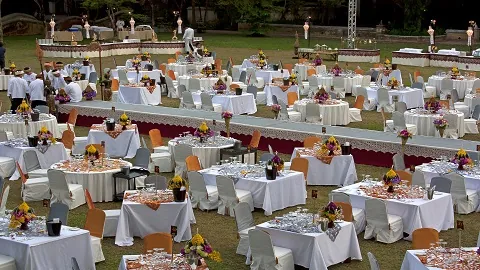Venue Coordinator
Welcome to the dynamic world of venue management, where the venue manager takes centre stage in event coordination and execution.
These high-profile professionals play a pivotal role in overseeing all aspects of a venue’s allocation and use, ensuring that operations run seamlessly, vendors are coordinated, and client needs are met. With an unwavering attention to detail and exceptional organizational skills, the venue manager is the mastermind behind creating memorable and successful events that leave a lasting impression on attendees.
- Introduction
- Typical Job Responsibilities
- Standard Work Environment
- Suggested Work Experience
- Recommended Qualifications
- Projected Career Map
- Beneficial Professional Development
- Learn More
- Conclusion
As a venue manager, your key responsibilities revolve around supervising event setups, collaborating with vendors, and managing staff. You'll be the point person for client interactions, ensuring that their needs and expectations are not just met but exceeded. Beyond this, you'll oversee all the logistical arrangements that make an event happen, from the finer details to the big picture. Budget management, promoting the venue, and ensuring that safety regulations are adhered to are all vital components of your role. You'll also be responsible for maintaining inventory, swiftly resolving any issues that may arise, and making sure that events run like well-oiled machines. Your goal is always the same - to guarantee exceptional guest experiences while upholding the venue's reputation and profitability.
Venue Coordinator
Welcome to the dynamic world of venue management, where the venue manager takes centre stage in event coordination and execution.
These high-profile professionals play a pivotal role in overseeing all aspects of a venue’s allocation and use, ensuring that operations run seamlessly, vendors are coordinated, and client needs are met. With an unwavering attention to detail and exceptional organizational skills, the venue manager is the mastermind behind creating memorable and successful events that leave a lasting impression on attendees.
As a venue manager, your key responsibilities revolve around supervising event setups, collaborating with vendors, and managing staff. You'll be the point person for client interactions, ensuring that their needs and expectations are not just met but exceeded. Beyond this, you'll oversee all the logistical arrangements that make an event happen, from the finer details to the big picture. Budget management, promoting the venue, and ensuring that safety regulations are adhered to are all vital components of your role. You'll also be responsible for maintaining inventory, swiftly resolving any issues that may arise, and making sure that events run like well-oiled machines. Your goal is always the same - to guarantee exceptional guest experiences while upholding the venue's reputation and profitability.
Venue managers are known for their versatility as they navigate a dynamic work environment. You'll split your time between office-based tasks and being on-site to ensure that everything is running smoothly. Your role involves liaising with clients, vendors, and staff, necessitating strong interpersonal skills. This means that you need to be adaptable to fast-paced, high-pressure situations, often requiring evening and weekend availability to oversee events. Your primary workplaces will be either organizational headquarters or event venues, with occasional travel for networking and site visits. To thrive in this environment, a proactive approach, effective communication, and a commitment to delivering exceptional event experiences are essential.
The best venue management candidates typically possess prior event management experience, demonstrating their ability to oversee logistics and ensure successful outcomes. Backgrounds in hospitality, conference management, or related fields can also be beneficial. Previous roles involving team leadership, budget management, and problem-solving contribute to a strong foundation for efficiently managing events.
While a bachelor's degree in hospitality management, event planning, or a related field can provide a solid foundation for aspiring venue managers, it's not mandatory. Venue managers regularly reach the highest-level positions through practical experience and endorsed certifications. Professional certifications can validate your expertise in event coordination and management, while any self-managed studies in marketing, finance, and communication will help you build the skills necessary for successful venue operations. Practical experience gained through internships or assistant roles further bolsters a good educational background, preparing candidates for the multifaceted responsibilities of the venue manager.
Your career as a venue manager begins with roles like event coordinator or assistant, where you gain hands-on experience in event planning, vendor management, and client interactions. As you progress, you may step into positions such as venue supervisor, where you oversee daily operations. With demonstrated expertise, you can advance to venue manager positions, taking charge of larger events and teams. Further growth opportunities may include becoming a director of venue operations, where you focus more on strategic planning and business development.
To continue your professional growth as a venue manager, attending workshops and training sessions on relevant topics such as event management, client service, and vendor coordination can help. Certifications specific to the events industry can enhance your qualifications and credibility. Cross-training in areas like budget management and team leadership can make you a more well-rounded professional. Engaging in industry conferences and networking events will help you build valuable connections and stay up to date with the latest trends – essential if you want to climb the leadership ladder, or perhaps start your own business and become your own boss.
Embarking on a career as a Venue Manager is a dynamic journey that involves overseeing the operations of event spaces, ensuring seamless and successful events. Here's a succinct overview:
- Venue Operations Management: Venue Managers excel in operations management, overseeing the day-to-day functions of event spaces, maintaining facilities, and ensuring a welcoming and functional environment.
- Event Coordination and Planning: Proficient in event coordination, Venue Managers collaborate with clients to plan and execute a diverse range of events, from weddings to corporate gatherings, ensuring each occasion meets or exceeds expectations.
- Client Relationship Building: Effective client relationship building is crucial, as Venue Managers liaise with clients, understand their requirements, and provide exceptional service to cultivate positive and lasting partnerships.
- Staff Leadership: Demonstrating effective staff leadership, Venue Managers coordinate event staff, security, and maintenance teams, ensuring everyone works cohesively to deliver outstanding experiences.
- Budgeting and Financial Management: Financial acumen is key, as Venue Managers handle budgeting, cost control, and financial reporting, optimizing resources to maintain the venue's profitability.
- Safety and Compliance Oversight: Ensuring safety and compliance, Venue Managers implement and enforce safety protocols, adhere to licensing requirements, and create a secure environment for both clients and attendees.
- Marketing and Promotion: Proficient in marketing and promotion, Venue Managers work to enhance the venue's visibility, attract clients, and maintain a competitive edge in the market.
- Facility Maintenance: Demonstrating expertise in facility maintenance, Venue Managers ensure that venues are well-maintained, aesthetically pleasing, and equipped with the necessary infrastructure for diverse events.
- Client Satisfaction Focus: Prioritizing client satisfaction, Venue Managers actively seek feedback, address concerns promptly, and strive to exceed expectations to ensure positive experiences for clients and guests.
- Adaptability: Adapting to diverse client needs and event requirements, Venue Managers stay flexible to accommodate various occasions and ensure the success of each event.
- Personal Traits for Venue Manager: Professionalism, attention to detail, effective communication, leadership, adaptability, problem-solving, customer focus, resilience, and a passion for creating memorable event experiences collectively define a successful career as a Venue Manager.
With an eye for detail, exceptional organizational skills, and a commitment to creating unforgettable event experiences, the venue manager ensures that every aspect of a venue is seamlessly executed. It’s a field bursting with incredible career opportunities for ambitious, outgoing individuals with a keen eye for detail, a passion for perfection and the ability to manager a complex workload. For those who climb the ranks to leadership level, it can also be highly lucrative – especially for those who consider the various entrepreneurship opportunities in venue management and event planning.










